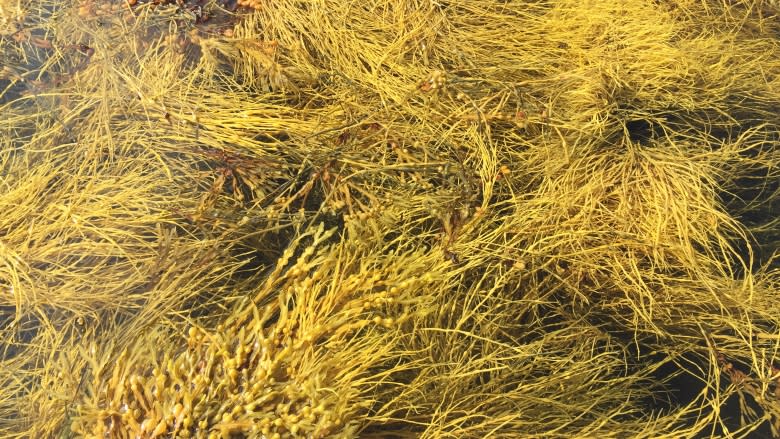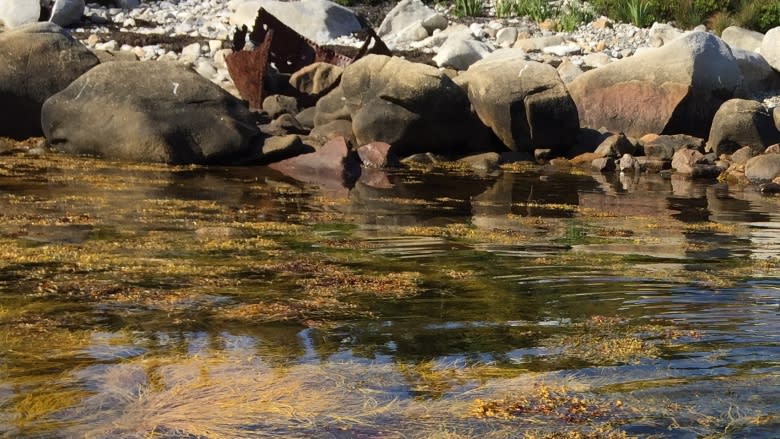Maine's top court hears N.S. company's arguments in seaweed harvesting case
Seven justices of Maine's top court are preparing to make a decision that could have serious implications for a Dartmouth, N.S., company and devastate a multimillion-dollar marine industry in that state.
And it all comes down to slimy seaweed.
Rockweed, a common seaweed that lines the shores of the northeastern U.S. and Canada's Maritime provinces, is big business. After processing, the rockweed industry is estimated to be worth about $20 million in Maine alone.
Dartmouth-based Acadian Seaplants Ltd. harvests rockweed and turns it into fertilizer and additives to animal feed.
In 2015, a group of homeowners in Maine took Acadian to court over the company's practice of harvesting in the intertidal waters adjacent to their land.
The homeowners claim that the seaweed belongs to them and the company has no right to harvest it without their permission.
But Acadian believes the seaweed is a public resource that, like fish, the public has a right to harvest.
In March, a Maine Superior Court justice ruled in favour of the homeowners. Acadian immediately appealed that decision.
Last week, lawyers for both sides made their oral arguments during the appeal at Maine Supreme Judicial Court.
Seaweed a 'product of the sea'
The company's argument is, in part, that seaweed is a marine organism that is more akin to shellfish than plants, so it should be included in public fishing rights.
"Rockweed, just like oysters, mussels and clams, is a product of the sea," argued Acadian's lawyer, Benjamin Leoni, in a written brief.
Leoni gave the court a biology lesson, explaining that the seaweed is created after male and female plants release free-floating eggs and sperm into the sea. Once an egg is fertilized, the "tiny rockweed organism" is then carried by the currents until it attaches itself to the rocky surface in the intertidal zone through a root-like system.
The seaweed doesn't get nutrients from soil, like a plant, the company's lawyer argued. Rather, it absorbs nutrients directly from the sea, like marine organisms.
'Indisputably a plant'
The lawyer for the homeowners, Gordon Smith, said the company's "novel" argument is "ignoring the basic biological gulf between plants and animals," and stated bluntly that rockweed is "indisputably a plant and not an animal."
Smith pointed out that rockweed is stationary and has the ability to photosynthesize.
"Shellfish … do not photosynthesize," he wrote.
Smith argued that the principles of property law mean that ownership of real estate includes the soil and whatever grows on it.
"Just as there is no dispute that terrestrial trees, shrubs and crops belong [to] the owner of the land on which they grow, there should be no dispute that rockweed, like any other plant, is the property of the owner of the flats on which it grows."
Fishing fowling and navigation
The company also argued that, since seaweed is harvested in boats, it should be considered fishing.
"They use boats and skiffs to extract the organisms," the brief states. "If harvesting a mussel constitutes fishing, then harvesting rockweed must as well."
Both sides argued that legal or historical precedents favoured their position in the case.
In Maine, colonial ordinances dating back to the 1640s refer to the public's right to "fishing, fowling and navigation."
But whether rockweed harvesting falls under any of those categories will be up to the court.
A decision could take six months or longer, Smith told CBC in an email.
Impacts on industry
If the court upholds the previous decision in favour of the homeowners, it could decimate the industry in Maine.
"The implications of this case are immense," wrote the company's lawyer in the brief. "An entire marine industry and the maritime jobs that depend on it rest on the outcome."
The decision is unlikely to slow down Acadian's extensive rockweed harvesting operations in Nova Scotia. The company has licences to harvest the seaweed here.
In Canada, property owners lay claim to everything up to the high water mark. Anything below that belongs to the Crown.



